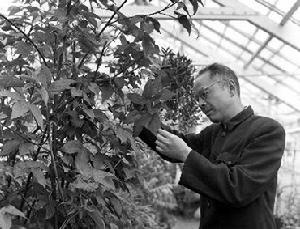The 100th anniversary of the birth of Cai Xitao falls on March 12, 2011. In this landmark year, XTBG organized series of events to commemorate him.
On March 12, the relatives, former students and colleagues of Prof. Cai Xitao gathered together in Kunming to commemorate his life and contributions.
In his speech, Prof. Chen Jin, director of XTBG, expressed his respect for Cai Xitao’s pioneering spirit and perseverence.
The participants at the gathering expressed respect and gratitude for the influence Prof. Cai Xitao brought to them.
An exhibition about Cai Xitao was held at the headquarters of XTBG, showing the life and work through the medium of photography.
A symposium on the scholarship of Cai Xitao is going from March 13-15 at XTBG. It's a celebration of Cai Xitao's ideas and their impact, giving new insight into his devotions to botanical studies.
The symposium also brought together many scholars to talk about sustainable use of plant resources.

In recognition of his outstanding contributions to the tobacco and rubber industries, and the devotion to botanical studies,Prof. Cai Xitao was honored one of the “60 People Who have Moved Yunnan since the Founding of China” in 2009.
Biography of Cai Xitao:
Prof. Cai Xitao (1911.04-1981.03) was native to Dongyang, Zhejiang Province. In 1930, after studying at various institutions in Hangzhou and Shanghai, Cai Xitao entered Jingsheng Botanic Laboratory in Beijing. In 1932, he conducted botanical research in Yunnan, where he collected thousands of plant specimens. In 1938, he founded Yunnan Agriculture and Forestry Plant Research Institute, which is the predecessor of Kunming Institute of Botany (KIB), CAS. In 1958, Prof. Cai Xitao led an 8-person group to Xishuangbanna to start the pioneering work of creating Xishuangbanna Tropical Botanical Garden (XTBG). In 1959, XTBG came into being under his leadership.
Mr. Cai Xitao knocked open the gate to the Kingdom of Plants of Yunnan Province.
Since 1930s, Prof. Cai Xitao kept on a comprehensive and deep investigation of plant resources in Yunnan Province. He placed emphasis on the application study of plants. In 1945, Prof. Cai introduced the precious tobacco species “Mammoth Gold” from the United States of America. Through propagation, cultivation and quality control of superior seeds, new tobacco varieties suitable for Yunnan were cultivated.
Later, he organized field investigations for rubber plantation and discovered that the area from latitude 21°N to 23°N was suitable for growing rubber trees. Today, tobacco and rubber have become two of the most important economic industries in Yunnan and have contributed significantly to China’s economy.
In addition to the development of tobacco and rubber industries, Prof. Cai Xitao has made important contributions to perfume industry, cultivation and utilization of medicinal plants and protection of tropical rain forests in Yunnan province.
The discovery of Dragon’s Blood tree in Southern Yunnan is another significant contribution of Prof. Cai Xitao. Although the history of using Dragon's Blood as a medicine in China is over one thousand years, it had to be imported from other countries until the 1970s, when Prof. Cai Xitao found Dragon's Blood tree in Southern Yunnan Province. Now, a dozen of domestic pharmaceutical factories are producing the medicine with an annual output value of more than 500 million yuan ($60 million).

